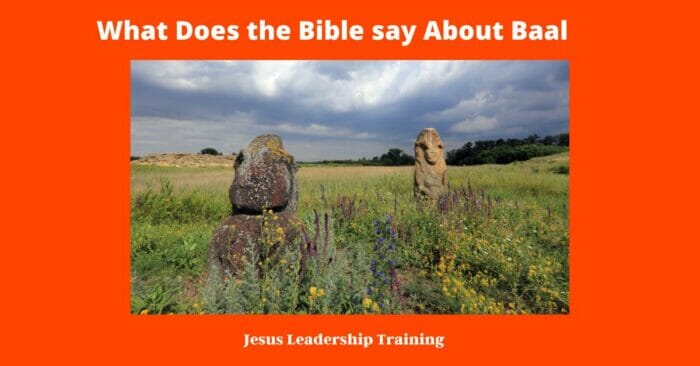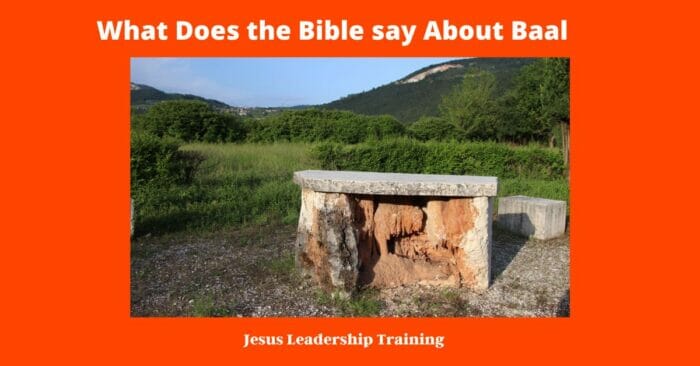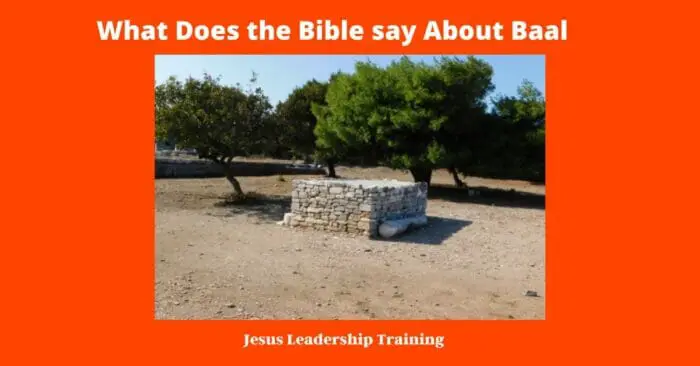What Does the Bible say About Baal – The Bible mentions Baal numerous times, primarily in the Old Testament. Baal was the chief Canaanite god, who was believed to be the ruler of the heavens and a fertility god. He was also associated with storms and rain, as well as with the underworld and the dead.
In the Bible, Baal is spoken of in a negative light, as an idol and a false god, and is associated with idolatry and paganism. The Bible speaks of the destruction of Baal’s temples and the idols associated with him. The Lord calls for the worship of him and his idols to be uprooted and destroyed, and for the people to turn away from his false practices. The Bible also calls for the eradication of all that is associated with Baal, and for the Lord’s people to remain faithful to Him.
Table of Contents
What Does the Bible say About Baal
The Bible is full of references to Baal, a powerful figure in ancient religions of the Near East. Baal was a fertility god, worshipped by many cultures in the Middle East and North Africa. Baal was a powerful figure in the Old Testament, where he was often mentioned in conjunction with other false gods of the time. In the Bible, Baal is often portrayed as the enemy of God, and those who worshipped him were condemned. In this article, we will explore what the Bible says about Baal, from his origin and history to his worship and consequences.
History of The God Baal In the Bible?
Baal is an ancient Semitic god of fertility, associated with rain, agricultural productivity, and other aspects of nature. Baal was worshipped throughout the ancient Near East, in cultures such as the Canaanites, Phoenicians, and the early Israelites. In the Bible, Baal is often referred to as the “Lord of the Earth” and is associated with agricultural fertility, storms, and thunder.
The history of the God Baal is an ancient and mysterious one. Referred to in Scripture, Baal was a popular deity worshiped throughout the Middle East in antiquity. For many years, his worshipers were devoted to him and believed he was the god of fertility, rain, and storms. But what does the Bible say about Baal? Let’s explore the history of Baal and the Bible’s references to this mysterious deity.

Associated Names of Baal
In antiquity, the God Baal was known by many names. His primary title was Baal, which is derived from the Semitic word ‘baal’, meaning “master.” He was also called Baal Peor, Baal Zebub, and Baal Berith. While these names all refer to the same god, they each have unique meanings that reflect different aspects of his character.
Baal Peor was the god of fertility and was often associated with the worship of idols. Baal Zebub was the god of flies, and was believed to be a patron of necromancy. Baal Berith was a god of oaths, and he was believed to be a god of war.
List of Forms of Baal
- Baal Zebub (or Beelzebub): Also known as The Lord of the Flies, Baal Zebub is an ancient Canaanite deity associated with the underworld and worshiped by the Philistines. He was often invoked in magical rituals and was believed to have power over disease and plagues.
- Baal Hammon: This was the chief god of the Phoenician pantheon, worshiped in the form of a bull. He was associated with fertility, abundance, and the power of the sun.
- Baal Melkart: This was a form of Baal worshiped in Tyre and Sidon, primarily by the Phoenicians. He was associated with the sea, fertility, and war.
- Baal Berith: This was a Canaanite god worshiped in the form of a bull. He was associated with the underworld and was believed to have power over the dead.
- Baal Peor: This was a Moabite god associated with fertility and sensuality. He was worshiped in the form of a bull, and his cult was seen as a threat by the Hebrews.
- Baal Hadad: This was a storm god worshiped in the form of a bull. He was associated with rain, thunder, and lightning, and was seen as a protector of justice.
- Baal Shemesh: This was a sun god worshiped in the form of a bull. He was associated with healing and fertility, and was seen as a protector of crops.
- Baal Shamem: This was a moon god worshiped in the form of a bull. He was associated with the night, and was seen as a protector of travelers.

Attributes of Baal
The God Baal was associated with many different attributes. As the god of fertility, he was believed to be responsible for the fertility of the land and the abundance of crops. He was also a god of rain and storms, and was thought to bring heavy rains to his worshippers in times of need.
In addition to his links to fertility, rain, and storms, Baal was also associated with war. He was thought to be a god of destruction and was believed to be able to bring destruction and chaos upon his enemies. As a result, he was often invoked by warriors to gain victory in battle.
List of types of Altars,Sacrifices, Human Sacrifices of Baal
- Stone Altar: A stone altar is a type of altar used for religious purposes that is made from rock. It is usually found in a temple or other religious building and is used to make offerings or sacrifices to the deity of choice. The stone altar is usually in a raised position and is sometimes surrounded by a fence or wall to protect it.
- Wooden Altar: A wooden altar is a type of altar used for religious purposes that is made from wood. It is usually found in a temple or other religious building and is used to make offerings or sacrifices to the deity of choice. The wooden altar is usually in a raised position and is sometimes surrounded by a fence or wall to protect it.
- Animal Sacrifice: Animal sacrifice is a type of sacrifice in which an animal is offered as a sacrifice to a deity. This type of sacrifice is common in many religions, including the ancient religions of the Mediterranean such as Baal worship. The animal offered in sacrifice could be anything from a goat or sheep to an ox or a bird.
- Vegetable Sacrifice: Vegetable sacrifice is a type of sacrifice in which vegetables are offered as a sacrifice to a deity. This type of sacrifice is common in many religions, including the ancient religions of the Mediterranean such as Baal worship. The vegetables offered in sacrifice could be anything from grains and fruits to vegetables such as cucumbers and onions.
- Human Sacrifice: Human sacrifice is a type of sacrifice in which a human is offered as a sacrifice to a deity. This type of sacrifice was practiced by the ancient Canaanite religion of Baal worship and was seen as a way to appease the gods. Human sacrifice was often seen as a way of appeasing the gods and gaining favor with them.

Temples of Baal
The worship of Baal was a popular and widespread practice during the Bronze Age. Many temples were built throughout the Middle East in honor of this deity. The most famous of these temples was the Temple of Baal at Palmyra, Syria, which was destroyed by the Romans in the 3rd century AD.
The worship of Baal was also practiced among the ancient Israelites. While the worship of Baal was officially forbidden by the Torah, some Jews still practiced his worship in secret. This practice was eventually abandoned by the Jews in favor of monotheism.
The history of the God Baal is a fascinating one. He was a popular deity in the Middle East for centuries, and his worshipers believed in his power to bring fertility, rain, storms, and destruction. While his worship has long since been abandoned, the memory of Baal still lives on in the Bible and the ruins of the temples built in his honor.
When is Baal Mentioned in the Bible?
Baal is mentioned numerous times in the Bible, from Genesis to the prophets. Some of the most prominent references to Baal can be found in the book of Judges, where the Israelites are warned about worshipping false idols and the consequences of this practice. Other references to Baal can be found in the books of Kings, Jeremiah, and Ezekiel.

List of Actual Hebrew Words (Symbols) that Translate Baal
- בַּעַל (Baʿal): This is the most commonly used word for Baal, meaning “Lord” or “Master.” It is used to refer to the Canaanite god and is found in the Hebrew Bible.
- בַּעַלְהוּ (Baʿal-hu): This is a variant of the word baal, meaning “his Baal.” It is used to refer to the Canaanite god and is found in the Hebrew Bible.
- בַּעֲלָה (Baʿalāh): This is a feminine form of baal, meaning “Lady.” It is used to refer to the Canaanite goddess Asherah and is found in the Hebrew Bible.
- בַּעֲלַיִם (Baʿalayim): This is a plural form of baal, meaning “Lords” or “Masters.” It is used to refer to the Canaanite gods and is found in the Hebrew Bible.
- בַּעֲלִים (Baʿalim): This is another plural form of baal, meaning “Lords” or “Masters.” It is used to refer to the Canaanite gods and is found in the Hebrew Bible.
- בַּעֲלַת (Baʿalat): This is a feminine form of baal, meaning “Mistress” or “Lady.” It is used to refer to the Canaanite goddess Asherah and is found in the Hebrew Bible.
- בָּעַל (Bāʿal): This is a contracted form of baal, meaning “Lord” or “Master.” It is used to refer to the Canaanite god and is found in the Hebrew Bible.
List of Actual Greek Words (Symbols) that Translate Baal
- Βααλ (Baal): This is the Greek transliteration of the Hebrew word “Baal,” which is derived from the Semitic root meaning “lord” or “master.” It is used to refer to a variety of deities in the Ancient Near East, including the Canaanite storm god, the Phoenician supreme god, and the Assyrian and Babylonian fertility god.
- βάλαιρα (balaira): This is the Greek word for “bull,” which is often associated with Baal in Greek mythology.
- βασιλεία (basileia): This is the Greek word for “kingdom,” which was associated with Baal in the bible.
- βασιλικός (basilikos): This is the Greek word for “royal,” which was also associated with Baal in the bible.
- βασίλισσα (vasilissa): This is the Greek word for “queen,” which was also associated with Baal in the bible.
- βασιλιάς (basilias): This is the Greek word for “king,” which is often used to describe Baal in Greek mythology.
- βασιλική (basilike): This is the Greek word for “imperial,” which was often used to describe Baal in Greek mythology.
List of Actual Aramaic Words (Symbols) that Translate Baal
- בעל (Ba’al) – This is a noun meaning “lord” or “master” and is derived from the Semitic root “ba’al”.
- בעל שדי (Ba’al Shaddai) – This is a combination of the words “Ba’al” and “Shaddai”, which is the Hebrew word for “Almighty”.
- בעל אל (Ba’al El) – This is another combination of the words “Ba’al” and “El”, which is the Hebrew word for “God”.
- בעל אורי (Ba’al Ory) – This is a combination of the words “Ba’al” and “Ory”, which means “Light” in Aramaic.
- בעל ברכה (Ba’al Berakha) – This is a combination of the words “Ba’al” and “Berakha”, which means “Blessing” in Aramaic.
- בעל משפחת (Ba’al Mishpacht) – This is a combination of the words “Ba’al” and “Mishpacht”, which means “Family” in Aramaic.
- בעל מונח (Ba’al Monach) – This is a combination of the words “Ba’al” and “Monach”, which means “Guide” in Aramaic.
- בעל מלחמה (Ba’al Milchamah) – This is a combination of the words “Ba’al” and “Milchamah”, which means “War” in Aramaic.
- בעל צדק (Ba’al Tsdak) – This is a combination of the words “Ba’al” and “Tsdak”, which means “Justice” in Aramaic.
- בעל הגלגל (Ba’al HaGagal) – This is a combination of the words “Ba’al” and “HaGagal”, which means “Wheel” in Aramaic.
Bible Verses about Baal
Where is Baal Mentioned in the Bible?
In the Bible, Baal is most prominently mentioned in the books of the Old Testament. Baal is mentioned in the books of Judges, Kings, Jeremiah, and Ezekiel.
- Elijah – Elijah was a prophet of the Lord who lived during the time of King Ahab and Queen Jezebel in Israel. He is best known for his confrontation with the prophets of Baal on Mount Carmel. He challenged them to a contest to prove whose God was the true God. After he called down fire from heaven and defeated the prophets of Baal, Elijah was regarded as the greatest prophet of his time.
- Elisha – Elisha was the successor of Elijah and the greatest prophet of his time. He was the most active prophet of his time in opposing Baal worship and idolatry. He performed numerous miracles, including the healing of Naaman’s leprosy and the raising of the Shunamite boy from the dead.
- Jeremiah – Jeremiah was a prophet of the Lord during the time of King Zedekiah in Judah. He was known for his opposition to idolatry, specifically of Baal. He warned the people of Judah of the impending destruction of Jerusalem and its temple if they did not repent of their idolatry.
- Isaiah – Isaiah was a prophet of the Lord in the time of King Hezekiah in Judah. He preached against the idolatry of the people, including the worship of Baal. He declared that God was the only true God and that only he could save the people from their sins.
- Amos – Amos was a shepherd who was called by the Lord to be a prophet during the time of Jeroboam II in Israel. He preached against the idolatry of the people, including the worship of Baal. He warned the people of the consequences of their idolatry, which would eventually lead to the destruction of their nation.
- Hosea – Hosea was a prophet of the Lord in the time of King Jeroboam II in Israel. He preached against the idolatry of the people, including the worship of Baal. He warned the people of their impending destruction if they did not turn back to the Lord.
- Micah – Micah was a prophet of the Lord in the time of King Hezekiah in Judah. He preached against the idolatry of the people, including the worship of Baal. He declared that the Lord was the only true God and that only he could save the people from their sins.
- Obadiah – Obadiah was a prophet of the Lord in the time of King Ahab in Israel. He preached against the idolatry of the people, including the worship of Baal. He warned the people of the impending destruction of their nation if they did not turn back to the Lord.
List of Hebrew Kings that Drifted into Baal Worship
- Ahab (874-853 B.C.): Ahab was the seventh king of the northern kingdom of Israel and reigned for 22 years. He was the son of King Omri and married Jezebel of Sidon. He was known for leading the nation into Baal worship, as he allowed the worship of the Canaanite god to spread throughout the kingdom.
- Jehoram (849-842 B.C.): Jehoram was the son of Ahab and succeeded him as the eighth king of Israel. He continued the Baal worship and led a large-scale campaign to promote it. He was assassinated by the leader of a rebellion against his rule.
- Ahaziah (841-840 B.C.): Ahaziah was the son of Jehoram and became the ninth king of Israel. He followed his father’s path of Baal worship, and was the last king of the Omrides dynasty.
- Jehoash (798-782 B.C.): Jehoash was the thirteenth king of Israel and succeeded his father, Jehoahaz. He was known for promoting Baal worship and was responsible for the introduction of pagan idols and rituals into the kingdom.
- Jehoahaz (814-798 B.C.): Jehoahaz was the eleventh king of Israel. He was the son of Jehu and succeeded his father as king. He was known for his devotion to Baal worship and was the last of the kings of Israel to practice it.
- Jeroboam II (793-753 B.C.): Jeroboam II was the fourteenth king of Israel and the grandson of Jehu. He was known for his commitment to Baal worship and was responsible for the spread of the religion throughout Israel.
- Menahem (753-737 B.C.): Menahem was the fifteenth king of Israel and the son of Jeroboam II. He was known for introducing pagan rituals and idols into the kingdom and was the last king of Israel to practice Baal worship.
What Sacrifices are Associated with Baal in the Bible?
In the Bible, Baal is associated with animal sacrifices, which were offered to him as a way of honoring and appeasing him. The Israelites, in particular, were warned against offering sacrifices to Baal in their worship of him. In the book of Judges, the Israelites are warned that sacrificing to Baal will bring destruction and death.
What Types of Baal Worship are Associated with Baal in the Bible?
In the Bible, the worship of Baal is associated with fertility cults, divination, and other forms of idolatry. In the Old Testament, the Israelites are warned against worshipping Baal and other false gods. In the book of Kings, it is mentioned that the Israelites were engaging in idolatry and worshipping Baal. In the book of Jeremiah, the false prophets are specifically said to have been worshipping Baal.
Who Were the Priests of Baal in the Bible?
In the Bible, the priests of Baal are mentioned in the books of Kings, Jeremiah, and Ezekiel. The priests of Baal were responsible for leading the worship of Baal and offering sacrifices to him. These priests were often seen as prophets and were looked upon as representatives of Baal.
What Does the King James Bible Say About Baal?
The King James Bible mentions Baal multiple times, most prominently in the books of Kings, Jeremiah, and Ezekiel. In the King James Bible, Baal is often portrayed as the enemy of God, and those who worshipped him were condemned. In the book of Kings, the false prophets are specifically said to have been worshipping Baal.
What Does the English Standard Bible Say About Baal?
The English Standard Bible mentions Baal multiple times, most prominently in the books of Kings and Jeremiah. In the English Standard Bible, Baal is often portrayed as a false god and those who worshipped him were condemned. In the book of Kings, the false prophets are specifically said to have been worshipping Baal.
What Does the World English Bible Say About Baal?
The World English Bible mentions Baal multiple times, most prominently in the books of Kings, Jeremiah, and Ezekiel. In the World English Bible, Baal is often portrayed as the enemy of God, and those who worshipped him were condemned. In the book of Kings, the false prophets are specifically said to have been worshipping Baal.
What Does the King James Version Say About Baal?
The King James Version of the Bible mentions Baal multiple times, most prominently in the books of Kings, Jeremiah, and Ezekiel. In the King James Version, Baal is often portrayed as the enemy of God, and those who worshipped him were condemned. In the book of Kings, the false prophets are specifically said to have been worshipping Baal.
What Does God Say About Baal in the Bible?
The Bible is clear in its condemnation of Baal and those who worship him. In the Old Testament, the Israelites are warned against worshipping false gods, such as Baal. In the book of Kings, the false prophets are specifically said to have been worshipping Baal.
What Examples of Baal are Found in the Bible?
In the Bible, there are numerous examples of Baal and his worship. In the book of Judges, the Israelites are warned against worshipping Baal and other false gods. In the book of Kings, the false prophets are specifically said to have been worshipping Baal. In the book of Jeremiah, Baal is mentioned in conjunction with other false gods.
What Are the Consequences of Worshipping Baal in the Bible?
In the Bible, worshipping Baal is seen as an affront to the true God, and those who do so are condemned. In the Old Testament, the Israelites are warned against worshipping false gods, such as Baal. In the book of Kings, the false prophets are specifically said to have been worshipping Baal and are harshly rebuked.
What Does the Bible Teach Us About Baal?
The Bible teaches us that Baal is a false god, and those who worship him will be condemned. The Israelites are warned against worshipping Baal and other false gods. The Bible also teaches us the consequences of worshipping Baal and other false gods, and warns us that it will bring destruction and death.
Final Thoughts – What Does the Bible Say about Baal
In conclusion, the Bible is clear in its condemnation of Baal and those who worship him. Baal was an ancient Semitic god of fertility, associated with rain, agricultural productivity, and other aspects of nature. Baal is mentioned numerous times in the Bible and is often seen as the enemy of God. Baal was worshipped throughout the ancient Near East and was associated with animal sacrifices, fertility cults, divination, and other forms of idolatry. The Israelites are warned against worshipping Baal and other false gods, and those who do so are harshly rebuked. The Bible teaches us about the consequences of worshipping Baal and warns us that it will bring destruction and death.




